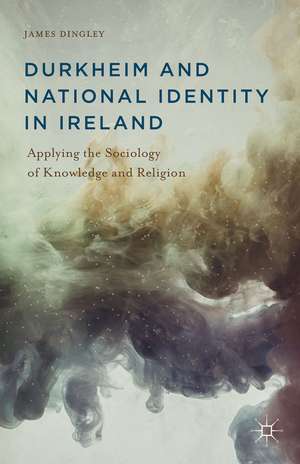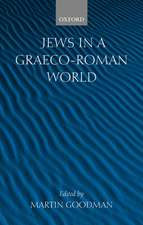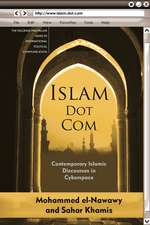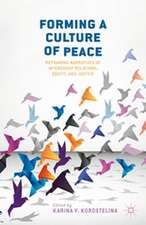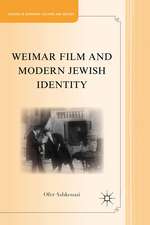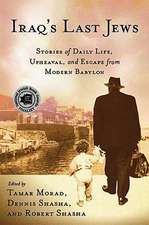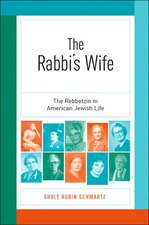Durkheim and National Identity in Ireland: Applying the Sociology of Knowledge and Religion
Autor J. Dingleyen Limba Engleză Hardback – 5 mar 2015
| Toate formatele și edițiile | Preț | Express |
|---|---|---|
| Paperback (1) | 382.57 lei 6-8 săpt. | |
| Palgrave Macmillan US – 5 mar 2015 | 382.57 lei 6-8 săpt. | |
| Hardback (1) | 387.58 lei 6-8 săpt. | |
| Palgrave Macmillan US – 5 mar 2015 | 387.58 lei 6-8 săpt. |
Preț: 387.58 lei
Nou
Puncte Express: 581
Preț estimativ în valută:
74.17€ • 77.15$ • 61.23£
74.17€ • 77.15$ • 61.23£
Carte tipărită la comandă
Livrare economică 15-29 aprilie
Preluare comenzi: 021 569.72.76
Specificații
ISBN-13: 9781137442581
ISBN-10: 1137442581
Pagini: 211
Ilustrații: VII, 211 p.
Dimensiuni: 140 x 216 x 14 mm
Greutate: 0.4 kg
Ediția:2015
Editura: Palgrave Macmillan US
Colecția Palgrave Macmillan
Locul publicării:New York, United States
ISBN-10: 1137442581
Pagini: 211
Ilustrații: VII, 211 p.
Dimensiuni: 140 x 216 x 14 mm
Greutate: 0.4 kg
Ediția:2015
Editura: Palgrave Macmillan US
Colecția Palgrave Macmillan
Locul publicării:New York, United States
Cuprins
1. Durkheim as a French Nationalist 2. Durkheim's Sociology of Knowledge 3. Nations and Nationalism 4. Ireland, The Revisionist Debate 5. Science and the Arts in Ireland 6. Ireland and Nationalism 7. Knowledge, Truth and the Problem of Useless Knowledge
Recenzii
"Durkheim and National Identity in Ireland provides an engaging analysis of the nation-building process in Ireland. Using Durkheim's theory, this book offers an alternative explanation for the transformation of religious, national, and cultural conflicts into moral ones. Its theoretical arguments and its re-examination of Irish history should capture the interest of scholars in nationalism, sociology of religion, and sociology of knowledge. Its sharp theoretical engagement should generate a nice debate among its Durkheimian as well as its non-Durkheimian readership." - Xabier Itçaina, Researcher, Center Emile Durkheim, Sciences po Bordeaux, France
"Analyses of conflict zones too often start from the conflict itself, this book instead explores how structures engender violence. Nor does Dingley just look at social, economic and political clashes. Using Durkheim's insights, he examines how competing value systems created the ground for conflict in Ireland, structuring difference in people's minds. As he points out, there is a fundamental need to address these underlying value systems if there is to be lasting reconciliation." - Peter Catterall, Reader in History, University of Wesminster, UK
"Dingley's study is a provocative and sustained synthesis of history and sociological theory that achieves a fresh interpretation of modern Irish nationalism and Ulster unionism." - Liam Kennedy, Professor Emeritus of Economic & Social History, Queen's University,Belfast, Ireland
"Analyses of conflict zones too often start from the conflict itself, this book instead explores how structures engender violence. Nor does Dingley just look at social, economic and political clashes. Using Durkheim's insights, he examines how competing value systems created the ground for conflict in Ireland, structuring difference in people's minds. As he points out, there is a fundamental need to address these underlying value systems if there is to be lasting reconciliation." - Peter Catterall, Reader in History, University of Wesminster, UK
"Dingley's study is a provocative and sustained synthesis of history and sociological theory that achieves a fresh interpretation of modern Irish nationalism and Ulster unionism." - Liam Kennedy, Professor Emeritus of Economic & Social History, Queen's University,Belfast, Ireland
Notă biografică
James Dingley is a sociologist who has researched terrorism and nationalism at the University of Ulster, UK, and Queen's University Belfast, Ireland. He is former Head of Department of Business and Management, University of Kurdistan-Hawler, Iraq, and Chairman of the Francis Hutcheson Institute, Belfast, Ireland. He has published widely in major international journals and this is his fifth book in the area of terrorism and nationalism.
